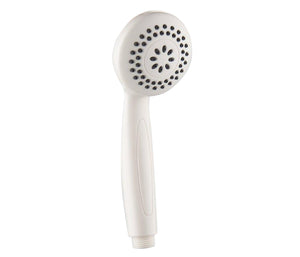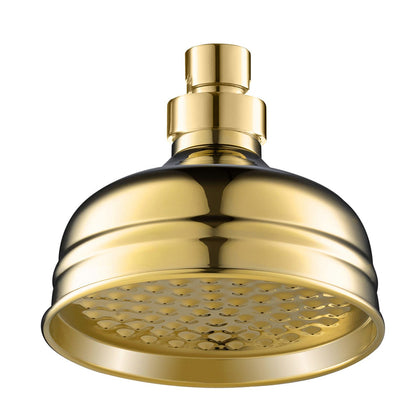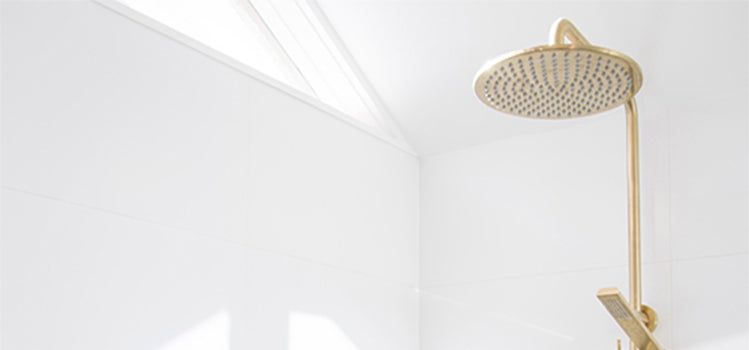Type needed
In the United States, standardized pipe thread sizes simplify the process of connecting a showerhead to the shower "elbow." Typically, the piping used for this connection adheres to a standard size of 1/2-inch, alleviating any concerns about compatibility between the shower head and the elbow.
When it comes to showerheads, the options are plentiful and diverse. As you explore the array of choices available, you'll encounter a wide range of showerhead types to suit varying preferences and needs.
Here are some common types of showerheads on the market:
Single Handle Shower Tap
The design of the single handle shower tap features a bowl-shaped head, facilitating easy fitting into the shower elbow. Known for its simplicity and versatility, this type of shower tap offers straightforward operation and adaptable functionality.
Handheld showerhead
The elbow serves as the connection point between the showerhead and the hose, facilitating the flow of water. Typically, the showerhead is affixed to a wall holder for stability and convenience. In certain cases, showerheads may come equipped with both traditional fixed heads and handheld options, offering users flexibility in their showering experience.
Rainfall Shower Head
Rainfall shower heads are typically connected to a lengthy P-and-L arm, which in turn attaches to the shower elbow. Positioned above the individual showering, these heads provide a luxurious and immersive showering experience akin to standing beneath a gentle rain shower.
If you're unsure about the type of shower head you need, consider bringing your existing showerhead for comparison. This allows you to evaluate the available options and make an informed decision based on your preferences. Additionally, capturing photos of your current shower setup can provide helpful visual references for selecting the most suitable replacement.
Pressurization
Showerhead with low water pressure
Showerheads come with varying pressure requirements to achieve optimal water flow. In some cases, your home's water pressure may not meet the necessary threshold for proper operation. Generally, showerheads require a water pressure of 40-60 psi to function effectively.
If you encounter low water pressure issues, there are several measures you can take to improve the situation.
Showerhead spray nozzle type
Spray
Showerheads offer various patterns and intensities of water spray. With modern designs, you have the flexibility to adjust settings directly on the showerhead itself. These settings include options to control both the temperature and the nozzle configuration. To find the perfect shower experience, it's essential to identify your preferences regarding spray type and intensity before selecting the appropriate settings.
You can find the necessary shower fixtures on a showerhead.
Broad
Broad spray is a common setting found in most showerheads. In this mode, each nozzle dispenses water at a consistent speed and intensity, providing widespread coverage for a refreshing and invigorating shower experience.
Targeted
In the targeted spray mode, specific nozzles emit water with increased force, providing a focused and powerful stream for targeted areas.
Rinse
In the rinse mode, the central nozzle dispenses water in a gentle flow, typically used for rinsing or soaking purposes.
Energy Consumption
Increased water pressure necessitates higher energy consumption. To conserve water and reduce energy usage, consider opting for showerheads labeled with WaterSense. Typically, shower heads and shower systems certified by the EPA with a WaterSense label are recommended for their water-saving capabilities.
Take a look
Ensure that the showerhead aligns with the aesthetic of your bathroom. It should blend seamlessly with your bathroom decor and contribute to the serene atmosphere you desire during your showers.
Follow these recommendations to determine the ideal shower head or system for your requirements. Shower time should be a delightful occasion. Prioritize investing in top-notch, efficient products. This advice serves as a roadmap to aid you in selecting the perfect showerhead or shower system. It's simpler than you anticipate. We extend our best wishes to you in your quest.
If you're interested in exploring unique and luxurious shower options, you might want to check out this blog post on Unveiling the Splendor of Showers: Exploring Various Types with a Touch of Gold. It offers valuable insights into incorporating gold elements into your shower design.






No comments:
Post a Comment